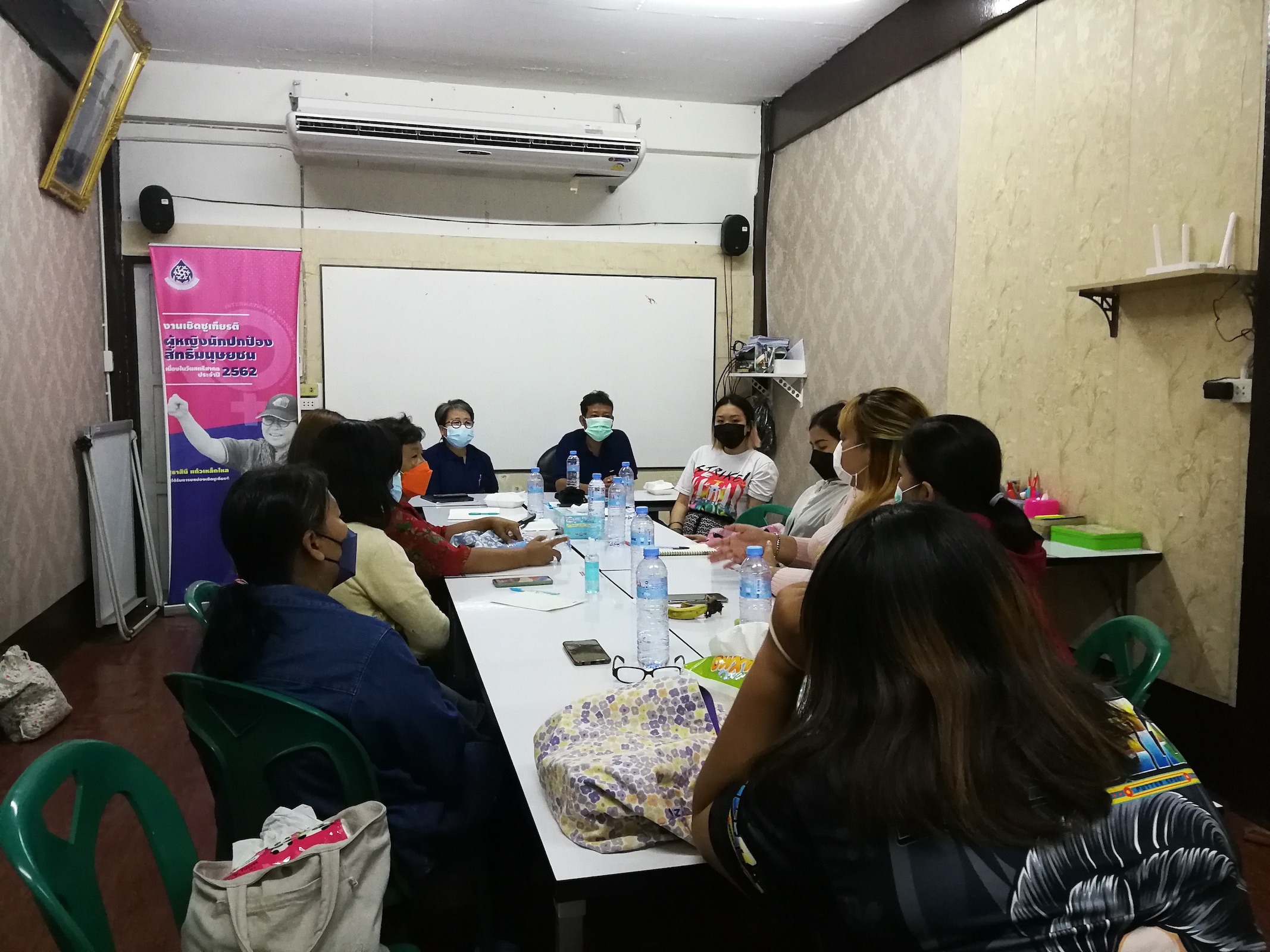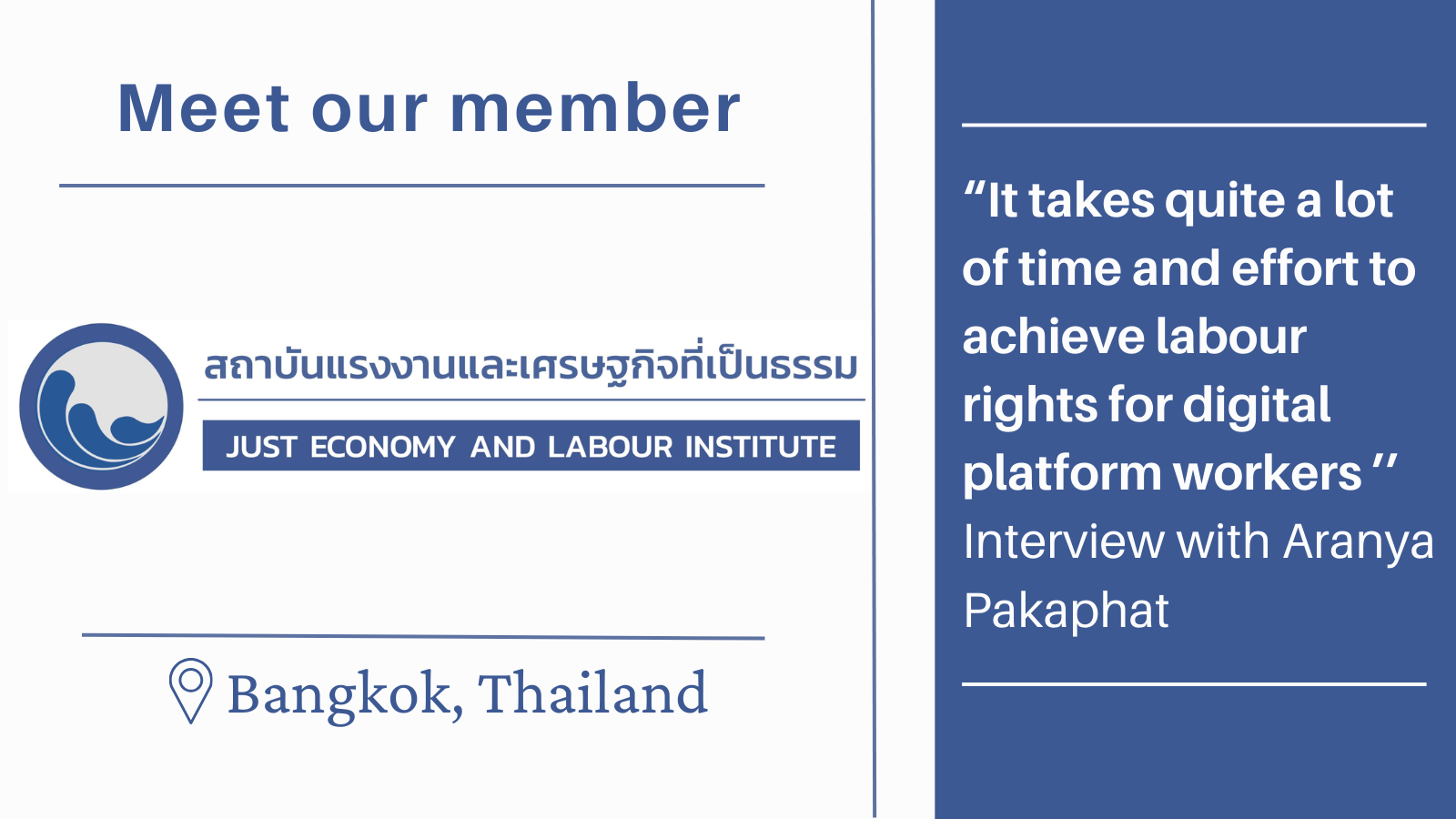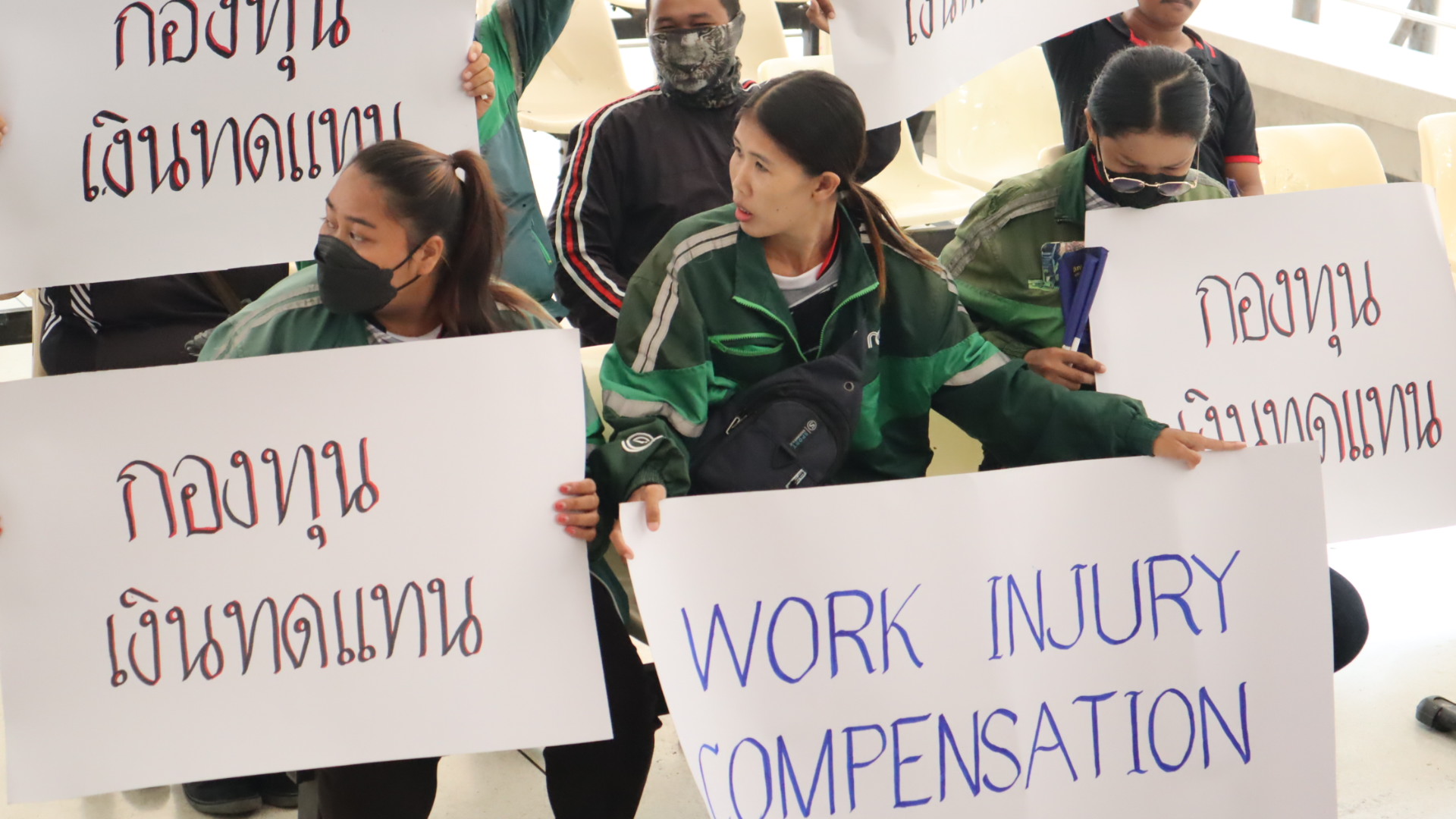Just Economy and Labor Institute (JELI) is a non-profit organization working to promote social justice and ensure the protection of labor rights in Southeast Asia, with a focus on Thailand. Michelle Soe, Programme Officer Communications and Kelly Van der Heide, intern from GAATW, had a interview with Aranya Pakaphat, Program Coordinator at JELI Foundation
Kelly: Thank you for joining us today. Can you tell us how and why was JELI founded?
Aranya: JELI was founded in 2017. We began working with the many unions in Thailand to train them and to build a stronger union movement. Later, we started doing research on the platform economy and got in touch with many gig workers, mainly focusing on delivery drivers, domestic workers, and massage therapists. The main issue we work on is workers’ rights. In the platform economy in Thailand, and other countries, many workers are really struggling to be protected under the labour law. This is because a lot of them are facing an issue of misclassification as they are not being recognised as employees of the company. This makes it difficult for them to access labour protection. They also don’t have a way of engaging in formal bargaining like with other trade union organisations. When they have issues such as grievances, they don’t have a channel to resolve this conflict. This is a really big challenge. We are focusing on occupational health and safety as there are many cases of accidents sometimes leading to death among delivery workers on the street while working. We also have cases where women experience a permanent injury and become incapacitated. This means she may have to be in a wheelchair all her life. These issues have not been fully addressed by the government. We have been doing a lot of advocacy and campaign work to get attention from both the government and the Ministry of Labour that these workers need protection as human beings and as workers who suffer from work-related accidents.

For the past 5 years JELI has been growing in terms of activities and programs and is now recognised by many workers and labour organisations who are aware that we’ve been focusing on cases of digital platform workers. Therefore, we are part of many dialogues and policy discussions around labour protection for these workers. The struggle to achieve labour rights for these workers takes quite a lot of time and effort.
Kelly: How are you incorporating the perspectives and lessons learned from those you are working with? What initiatives are there to strengthen their voices?
Aranya: Digital platform workers are workers. They are part of the labour movement but unfortunately, many of them have not been part of the trade union movement. I think in some countries many unions have actively organised and advocated for their rights. In some countries, however, many unions face difficulty or legal obstacles in organising beyond the scope of existing membership. This is because of the labour laws in the country and the interpretation of the ministry regarding who has the right to organise and who doesn’t. We just have to insist that they deserve labour and human rights protection. This has been our stand.
Many worker groups have formed their own independent organisations, a kind of self-help. They help one another when they have difficulties or accidents on the street. For example, if their motorbike breaks down, they support one another financially and when someone has to go to the hospital since they don’t get proper coverage from labour law protection. These organisations of workers exist among the digital platforms. They also know, because of the activity that JELI has been organising with them, are learning about labour law and human right perspectives so many of them have become leaders of their groups and have actively participated in national dialogues such as the Human Rights Commission dialogue meeting with the platform companies and with political parties. These platform meetings are sometimes organised by JELI and sometimes by other organisations or unions. Even the ministry has started to organise some meetings involving different stakeholders. JELI has been training workers, particularly women, to take up leadership roles in the movement as women's leadership is our focus. Of course, among the digital platforms particularly delivery drivers, the majority are still men, but we believe in women's leadership. We believe that if women take an active role in the movement and become leaders, they can do better. A lot of the women workers who we work with are single mothers. They have a big responsibility caring for children and elderly parents and then also working to earn money to support their family. This is a very heavy burden on them, but we have found that it makes them good leaders because they are aware of the difficulties and can listen and better understand members' needs.
We do activities with grassroot organisations. In the north, and with the support of GAATW, we are able to work with the women migrant workers in Chiang Mai, many of whom live and work in construction camps. They have formed their own organisations to help one another and to try to ease the difficulty of being a migrant in Thailand. Their living and working conditions are really difficult, and we are trying to see how we can get them to step forward and speak out about the labour situation so that they can gain improvements. However, with their vulnerability this takes a lot of time because they are mainly working here on short-term permits. Our research right now is how to combine migrant worker issues with Thai worker issues and encourage them to form one movement so they can help one another improve conditions. This is particularly important for migrant workers who have not been able to access full social security coverage in Thailand.
Michelle: You said the government lacks awareness regarding protection mechanisms. Do you think conditions will get better under the new government?
Aranya: We hope so. We have been under military regimes for nearly 10 years and hope this will be a better government, but with the current situation, we need to continue our work in advocating for workers rights. Last week we were trying to follow up on our campaign for occupational health and safety for delivery workers. We went to the Ministry of Labour and met with the top officials alongside the drivers and their families, one of whom lost their daughter and another is incapacitated. We had a dialogue, but then we realised more work had to be done because one meeting would not change anything. Therefore, we have continued communication through social media and we contact the ministry nearly every day regarding the cases of the drivers who have not been compensated for the loss of lives or for becoming disabled. The platform company always denies that they have any liability over these workers. We have found that the ministry is now trying to be quite active and is following up with us about cases to see if there is anything that they can do. They recognise that the law in Thailand is an obstacle that makes the worker unable to access legal channels. Factory and manufacturing workers have access, but delivery drivers don’t. The ministry has tried to contact the platform company at our request. This is a positive change because, in the past, we found them rather silent as they didn’t want to upset the company. Now they’ve realised that they have to do something, or families and workers will keep showing up at the ministry. However, we know that this level of activeness will not go anywhere if we don’t keep pushing and advocating to solve these cases. These workers must be recognised as employees so that they can access full coverage and labour law protection.
Michelle: If they receive full coverage, will they have to start paying taxes?

Aranya: They already pay taxes. If you order food the worker gets their wage through piece rate (20 or 30 baht per order) and in that wage payment the company deducts taxes. The worker will get a slip but not everything is fully transparent, and we are not sure if the company reports all of the orders and taxes to the government. We have a digital ministry in Thailand, but they have a lot to catch up on with this digital technology and how they should inspect and calculate taxes. If you want full coverage, you must pay a contribution. This is not very big, and most of it goes to worker pensions. Currently, the majority of people have no pension scheme. My uncle worked for 40 years and now only receives 700 baht per month (20$) from the government. Without full social security coverage that is all you get per month as a Thai citizen. It does not even pay for electricity, which is nearly 2000 baht. Another important aspect of social security is occupational health and safety compensation. This is the employer’s contribution, not the workers', and we’ve been advocating for it. This compensation fund covers workers if they have a work accident or sickness from working in a textile factory, injury, disability, or death. The worker, however, must be recognised as an employee in order for the company to be required to pay a contribution to this fund.
Michelle: Do you have a rough estimate of how many women hold delivery driver jobs and what are the unique challenges that they face?
Aranya: The gig economy is big and covers a lot, including the online platform of e-commerce. JELI focuses on delivery workers, massage therapists, and domestic workers. There are approximately six hundred thousand drivers and 20% of these are women. In the south, it is 40% because after the pandemic many women lost their service industry jobs, such as in hotels and restaurants, and started working in food delivery. Many are single mothers, and since they are part of the informal economy, they don’t have access to child benefits or maternity protection. They have to cover everything on their own. All the women I have talked to are in debt.
A lot of platform companies are foreign-owned. The government does not recognise workers as employees because they view them only as piece-rate workers who can choose their hours. According to our research, however, the majority of them work full-time. They work long hours, 6am to midnight sometimes, with no sleep. They also work with speed in mind which causes accidents. During COVID when there were a lot of orders, they could make 1000 baht per day, but now they have to double their hours to make that much.

We have also been exploring alternatives to advocating at the Ministry of Labour, for example, advocating with the consumers. Hopefully, we can gain perspectives and build cooperation with consumer groups to build up a campaign that supports food delivery workers whom they connect with. The question is how do we get consumers to play an active role in supporting them and what can they concretely do? We need to empower the workers and show the governments that all the organisations are paying attention, and that they must do their jobs. We have tried to connect with consumers through our webpage, but that is just online, we need actual support in practice because when people become aware, they are supportive.
Riders don’t know how to explain to consumers that they are suffering. Food delivery platforms have started batch work where drivers are assigned to pick up 2 or 3 orders at a time. This makes drivers very unhappy because they get paid less and there are more complaints from consumers since orders take longer to deliver. The company wants to save labour costs and the worker is forced to comply. There are a lot of grievances like this but no channels to resolve them. Workers are unable to complain when they are in a bad situation because the consumer has more power. There are also cases where, for example, hospital workers want the food delivered inside, but the platform says the drivers must leave it at the door. In these situations, consumers may threaten to cancel their order if the drivers don’t listen to them, but it’s against the platform's policy. Therefore, drivers are being punished unfairly.
We want to launch a campaign, a call to action, a social movement, for consumers to support. If you have any ideas or suggestions for how we can do this in practice, please let us know!


